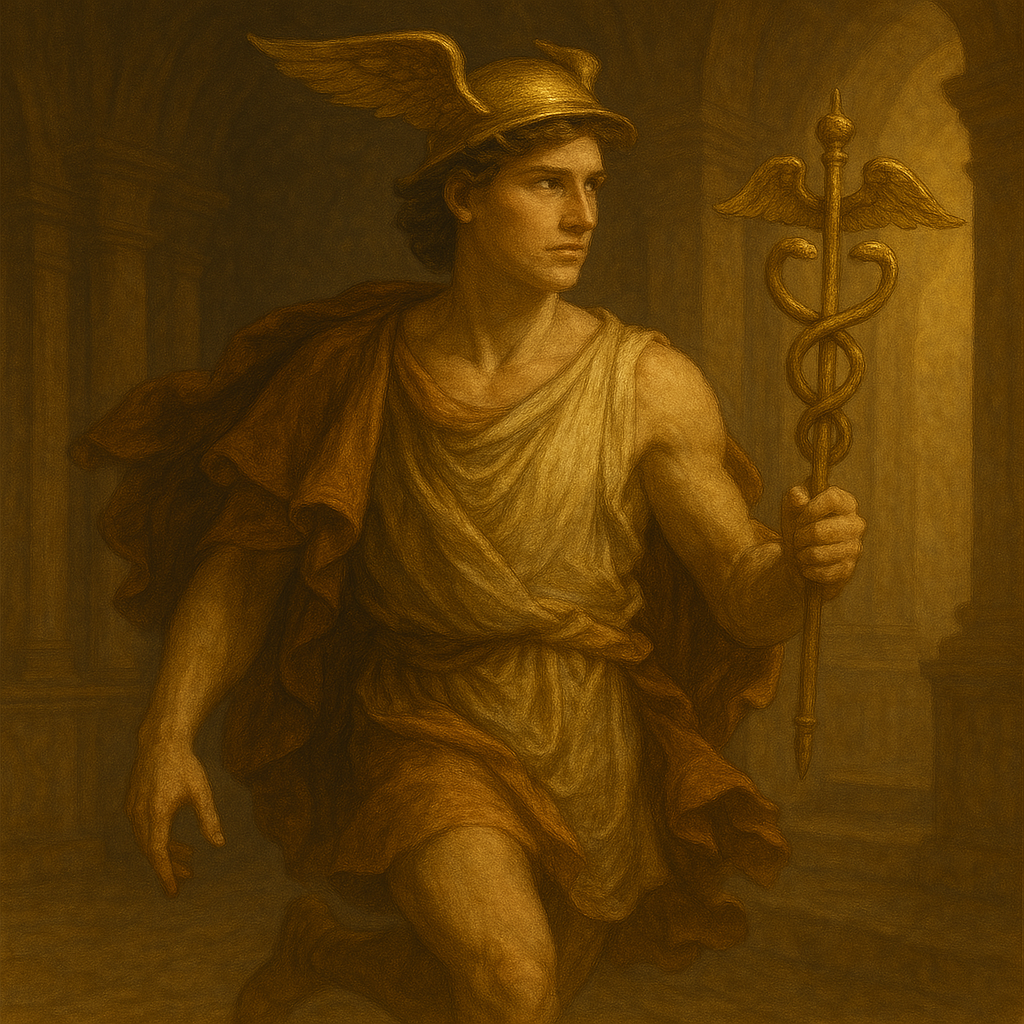Overview
Hermes, known to the Romans as Mercury, is the ancient Greek god of communication, travel, commerce, trickery, and divine messages. As the swift-footed Messenger of the Gods, Hermes moves freely between worlds—Olympus, Earth, and the Underworld—carrying messages and guiding souls. He is a god of movement and flow, embodying speed, wit, adaptability, and transformation. Playful and cunning, yet profoundly wise, Hermes is the guardian of boundaries and the patron of those who cross them: travelers, merchants, thieves, and seekers of knowledge.
Origins and Mythological Role
Hermes is the son of Zeus and the mountain nymph Maia, making him one of the younger Olympian gods. He was born in a cave on Mount Cyllene in Arcadia and was already mischievous and clever from the moment of birth.
In his first day of life, he:
- Escaped his cradle
- Invented the lyre using a tortoise shell
- Stole the cattle of Apollo
- Negotiated forgiveness by gifting the lyre to his brother—an act that marked him as the god of negotiation and exchange
Hermes quickly earned a place on Mount Olympus as the divine herald and ambassador between realms, both revered and unpredictable.
Symbols and Iconography
Hermes is often depicted as a youthful, agile figure in motion, wearing traveler’s gear and bearing the tools of his divine office.
Common Symbols
- Caduceus – A staff with two intertwined serpents, representing communication, commerce, balance, and transformation
- Winged Sandals (Talaria) – Granting him speed and freedom of movement
- Winged Helmet (Petasos) – Symbolizing his swift intellect and divine authority
- Tortoise – Tied to his invention of the lyre and symbolic of cunning and creativity
- Purse or Pouch – Signifying his role as god of commerce and wealth
He is also associated with:
- Roads, crossroads, thresholds, and doorways
- Birds, particularly the hawk, a messenger of insight and rapid perception
Attributes and Powers
1. Messenger and Herald of the Gods
Hermes is the divine communicator who carries messages, dreams, and prophecies between gods and mortals. He serves as a mediator, interpreter, and envoy, known for delivering both literal messages and deeper truths.
2. Guide of Souls (Psychopomp)
Hermes is one of the few gods who freely enters and exits the Underworld, guiding souls to the afterlife. As Psychopompos, he eases transitions between life and death, offering comfort in endings and support in liminal spaces.
3. God of Commerce, Travel, and Trade
Hermes protects merchants, travelers, and tradespeople, overseeing exchange, contracts, and transactions. His energy is found in markets, ports, and crossroads—places of interaction and movement.
4. Patron of Thieves, Tricksters, and Inventors
As a master of deception and wit, Hermes supports cleverness, mischief, and ingenuity. He values adaptability, problem-solving, and innovation, making him the divine patron of inventors, storytellers, and those who navigate complexity.
5. God of Language, Rhetoric, and Divination
Hermes governs the power of words and symbols, whether spoken, written, or gestured. He presides over languages, writing systems, omens, and esoteric teachings, bridging the material and spiritual worlds through expression.
Key Myths and Stories
Hermes Steals Apollo’s Cattle
As an infant, Hermes steals Apollo’s sacred cattle and hides them by making them walk backward. When caught, he defuses Apollo’s anger by offering him the lyre, showing his charm, diplomacy, and capacity to transform conflict into alliance.
Hermes and Persephone
In the Persephone myth, Hermes is the god who escorts Persephone between the Underworld and Olympus, acting as a guide through the shadow realms and a facilitator of cyclical renewal.
Inventor and Magician
Hermes is credited with inventing musical instruments, the alphabet, numbers, weights and measures, and even fire-making. These stories emphasize his role as a divine alchemist and culture-bringer.
Temples and Worship
Herms and Sacred Markers
- Herms were stone pillars with Hermes’ head and phallic symbol, placed at borders, doorways, and crossroads to ensure safe passage and fertility
- Travelers and merchants left offerings for protection and success
Sanctuaries and Cults
- Hermes was honored in Arcadia, Athens, and Olympia, with shrines often placed near city gates and along roads
- He was invoked in rituals related to harvest, negotiation, protection, and initiation
Festivals
- Hermaea – Festivals held in Hermes’ honor, especially among youth, involving athletic contests, games, and rites of passage
Spiritual and Archetypal Significance
In modern metaphysical, psychological, and esoteric frameworks, Hermes represents:
- The Messenger Archetype – Communicator, translator, and mediator between realms
- The Trickster – Creative, subversive, breaking rules to reveal truth and spark evolution
- The Psychopomp – Inner guide through transition, shadow work, and spiritual awakening
- The Magician and Alchemist – Bringer of transformation through symbols, movement, and insight
- The Seeker and Wanderer – Always in motion, Hermes awakens curiosity, adaptability, and freedom
He is invoked for:
- Guidance during transitions, journeys, or liminal states
- Support in communication, writing, and divination
- Protection while traveling or negotiating deals
- Inspiration in creativity, learning, or innovation
Conclusion
Hermes is the ever-moving force of communication, transition, and transformation—a divine guide for those who walk between worlds, question norms, or seek deeper truths. With winged sandals and a sly grin, he reminds us that flexibility is wisdom, that language can unlock magic, and that laughter, invention, and cleverness are sacred tools. As the messenger, trickster, and soul guide, Hermes offers a path of liberation, learning, and discovery, for those willing to travel beyond the familiar.

